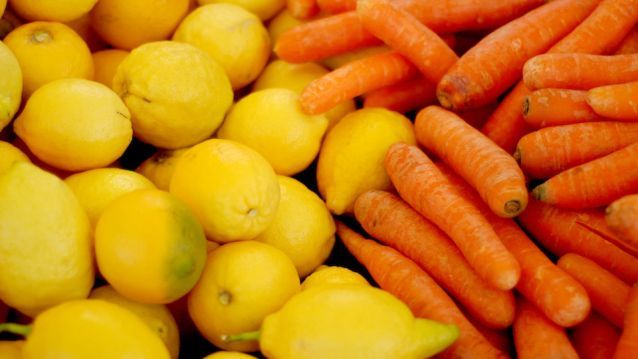You have likely heard the phrase, “When life gives you lemons, make lemonade.” This proverbial phrase has long been used to foster optimism and a good attitude in the wake of difficult times. There is another lemon phrase that you may not be as familiar with that has to do with health. “A lemon a day can keep many ailments away.” There is incredible power in this little yellow citrus fruit, and it may just be the natural remedy that you have been looking for.
Lemons are a nutrient powerhouse
Lemons are loaded with vitamins, minerals, phytonutrients, and antioxidants. Not only that, they are an excellent source of vitamin C and folate. According to Purdue University Horticulture Department, lemons are one of the most popular acid citrus fruits.
The World’s Healthiest Foods tells us that just a quarter cup of lemon juice provides 31% of the recommended daily intake of vitamin C, 3% of folate, and 2% of potassium and only 13 calories. A medium-sized raw lemon contains 139 percent of the recommended daily intake of vitamin C.
Health benefits of carotenoids
Carotenoids are plant pigments that give many fruits and vegetables their bright red, yellow, and orange glow. The pigments play a vital role in keeping plants healthy; however, they also offer us tremendous protective health benefits as well. Carotenoids help plants to absorb light energy that they use in photosynthesis. In addition, they help deactivate free radicals that can cause damage to cells.
When we consume foods rich in carotenoids, they work as powerful antioxidants in our body. Some carotenoids are converted into vitamin A which is important for vision and growth and development. Additionally, carotenoids have potent anti-inflammatory and immune-boosting benefits that have been linked to the prevention of cardiovascular disease. The consumption of carotenoid-rich fruits and vegetables also appears to offer cancer-preventing benefits.
Best sources of carotenoids
As mentioned above, foods rich in carotenoids are often, but not always red, yellow, or orange. Carrots, yams, sweet potatoes, papaya, watermelon oranges, mangos, spinach, kale, tomato, and bell peppers all contain carotenoids.
The downside to carotenoids
The one drawback with carotenoids is that they can have low bioaccessibility and bioavailability, which means that when you eat carotenoid-rich foods like carrots, your body may not be able to absorb many of the health-promoting carotenoids.
Eating lemons with carotenoid-rich foods
A 2018 study published in the International Journal of Nutrition and Food Engineering found that lemons may solve the bioavailability issue when it comes to carotenoid-rich foods. The study found that when the carotenoids in boiled or mashed carrots were combined with lemon juice, olive oil, and whey curd, they were almost 81% percent more bioaccessible than without. What this means is that lemons, which have great health benefits of their own, can also be an effective exigent food. This means that they can help bring out the best in other foods they are combined with.
How to add more lemons to your diet so that you can absorb carotenoids
Here are some tips on how you can absorb more beneficial carotenoids from your food.
- Squeeze some fresh lemon juice into orange and tomato juices.
- Make a vinaigrette for your salad using equal parts lemon juice and olive oil along with your favorite herbs.
- Squeeze some fresh lemon over cooked carrots or tomatoes.
- Add some lemon to your fruit smoothie.
- Make your own bruschetta topping using chopped carrots, tomatoes, onions, lemon zest, lemon juice.
Additional health benefits of lemons
In addition to helping release the power of carotenoids in certain foods, lemons stand tall on their own with a plethora of health benefits including:
- Lemons are good for your heart – Research shows that eating fruits and vegetables that are high in vitamin C can reduce your risk of heart disease and stroke. The fiber and plant compounds in lemons can also reduce risk factors for heart disease. In one study, eating 24 grams of citrus fiber extract daily for one month reduced total blood cholesterol levels.
- Lemons can help with weight control – Plant compounds in lemon extracts have been found to prevent and reduce weight gain. Mice who were fed a high-calorie diet were also given lemon polyphenols from the lemon peel. A control group did not eat the peel. The group that ate the peel gained less weight and had lower body fat than the group that did not eat the peel.
- Lemons are a great anti-aging food – Research supports that antioxidants can effectively slow aging and improve the health and vitality of skin. Patients who present with acne may benefit from using antioxidants in combination with conventional therapy, as indicated in a study out of Turkey. Other research suggests that lemons are a useful remedy for dark spots, pigmentation, blackheads, and pimples.
- Lemons could help fight cancer – A diet rich in fruits and vegetables may help to prevent some types of cancer. Studies conducted in test tubes show that lemons contain several cancer-killing compounds. More research is needed to determine the same impact on the human body. Animal studies show that D-limonene, a compound found in lemon oil, contains anti-cancer properties.
- Lemons can help relieve a sore throat – If you feel a sore throat coming on, this elixir made using lemons, and other natural ingredients can help ease pain and swelling while boosting your immune system. Combine 2 Tbsp apple cider vinegar with 2 tsp raw honey and 2 tsp lemon juice and mix in warm water. Drink to soothe your throat and boost your immune system.
-The Alternative Daily

